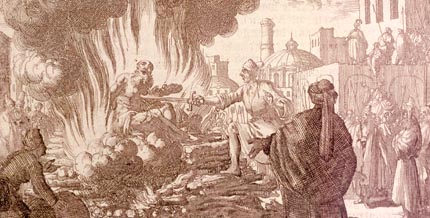Saint Polycarp

One of the most renown and beloved saints of the early Church was Polycarp. This great man lived from 69-155 A.D. Polycarp knew the Apostle John and was a disciple of the the beloved Apostle. Irenaues, another great man among the Early Church Fathers, was a disciple of Polycarp. Read what Irenaues wrote Polycarp his teacher. He says "I distinctly remember the incidents of that time better than events of recent occurrence ... I can describe the very place in which the Blessed Polycarp used to sit when he discoursed ... his personal appearance ... and how he would describe his intercourse with John and with the rest who had seen the Lord, and how he would relate their words."
Polycarp became the Bishop of Smyrna and he vigorously defended the Gospel against the growing heresies of his day. He was deeply sorrowed by the rise of heretical movements inside and outside the church, yet he knew that he had to defend the truth against them, and he did for many years.
In 155 A.D. during a festival at Smyrna (these were Olympic like games), eleven Christians were brought into the arena and martyred for the enjoyment of the cheering crowds. The crowd, its appetites whetted with the blood of these saints, called for elderly and beloved bishop Polycarp to be brought in to the arena as well. Men were sent to get him and after a time this was done and he was brought in to satisfy the blood thirsty throng. The political leaders of the town wanted to spare the old man and let him go. They told the eighty-six year old saint that if he would only renounce Christ, he could go free. Here is Polycarp's response to them. "Eighty and six years have I served Him and He hath done me no wrong. How then can I speak evil of my King who saved me?"
 On that same day the second century church's beloved Polycarp joined the growing list of Christian martyrs. He, like so many of his brethren (and our's), he preferred to a suffer cruel death rather than renounce the Lord of Glory. Polycarp was led to a post surrounded by kindling. He knew the Spirit of the Lord would give him the strength to stand firm. A blaze was set and we was burnt at the stake and then stabbed.
On that same day the second century church's beloved Polycarp joined the growing list of Christian martyrs. He, like so many of his brethren (and our's), he preferred to a suffer cruel death rather than renounce the Lord of Glory. Polycarp was led to a post surrounded by kindling. He knew the Spirit of the Lord would give him the strength to stand firm. A blaze was set and we was burnt at the stake and then stabbed.We live in trying times, but we, in this country, have not yet been called on to defend the truth of Christ with our lives as have so many Christians of the past have had to do, and as many Christians still have to do around the world even today. In Polycarp's day the Christian Church existed in only small parts of Africa, Asia and Europe and in all these places the faith was outlawed and Christians were, in periodic waves, severely persecuted, tortured and killed. In all the rest of the world then brutal acts of human sacrifice and differing types of cannibalism were quite common. These horrible things were often normal to much of the pagan world. We often forget that the pre-Christian (non-Judaic) world, the pagan world, was a world of pitch-black spiritual darkness.
Today, there are hundreds of millions of Christians and they live in most parts of the world. Our King, Jesus, is, even now, conquering the nations with the power of His Gospel. In Polycarp's day the world was far worse than it is today, because Christianity had not yet tempered any part of it. We are commanded, by our King, to "make disciples of all the nations" and teach them to observe all that He has commanded. There is still much for us to do. There is much that we can learn from Polycarp and other godly men and women who have come before us.
Coram Deo,
Kenith


No comments:
Post a Comment